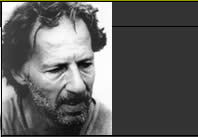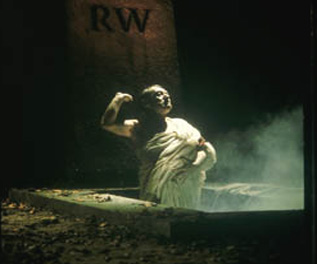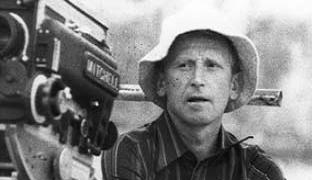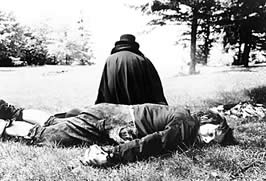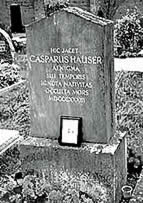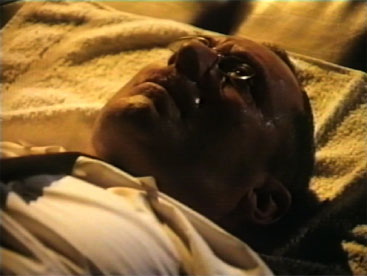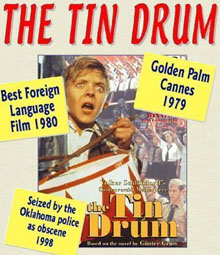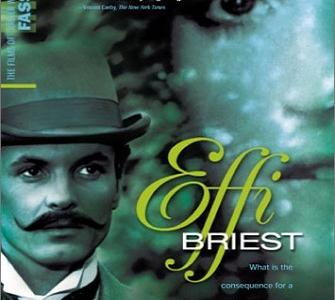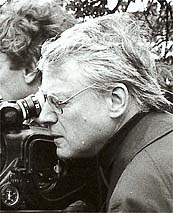 | Germany: Das Neue Kino |
|
Werner Herzog |
Hitler, Ein Film aus Deutschland |
Jean-Marie Straub |
|
Kaspar Hauser |
Kaspar Hauser |
Hitler, Ein Film aus Deutschland |
|
Жестяной барабан |
Rainer Werner Fassbinder''s film |
Alexander Kluge |
70% theaters were destroued during the war. Das Neue Kino were sown at the Oberhausen Film Festival in 1962. Manifesto of Freedom, mostly Marxist aesthetics, materialist cinema, experimental avant-garde. Straub/Huillet: cuinema is communication medium whose basic (the shot) is a discrete unit of perception: every shot, and every individual frame offers a unique perceptuakl perspective on some event or object. But in the conventional narrative cinema of the Western capitalist countries, those perceptual perspectives have been ideologically appropriated to create fictions about life, and we, the audience, have been ideologically conditioned to exept and recieve these fictions. From the Marxist perspective, fiction or narrative is defined as a bourgeous form designed to propagate illusion about the real nature of our society and our lives within it in order to divert our attention from the exploitation, violence, and oppression that are the necessary by-producs of our ecomomic system; the Marxist insist that our cinema and most art forms has traditionally been a narrative medium whose purpose is the creation of illusionist spectacle that serves the ideology of the ruling class.
What the new breed of radical filmmakers attenpted is the Deconctruction of bourgeous perceptual ideology through a deconstruction of convertional cinematic language- language that haas, since its inception and throughout its history (during the period of Soviet silent realism, Italian neorealism, French New Wave) been a bourgeous medium for the production of narrative pleasure. J.Dudley Andrew summarizes the Marxist position:"The Marxist call for a critical cimema which will ''deconstruct'' itself at every moment. Instead of fabricating an illusion, this cinema will let the viewer see beneath the images and the story to the process of creation itself... Every subject should be exposed for its socioeconomic underpinnings; every signification (every imige and narrative relation) should expose its own work. This way we can strive toward the conscious reshaping of the world." In other words, the cinema''s enslavement to a narrative code of vision has radically restricted its potential for the expression of new cultural realities. Radical filmmakers attenpted to tap that potential as never before, and it was this effort -much of it successful-that lent the quality of strangeness and mystery and otherness to their films.b They were groping toward a new cinematic language with which to express the formerly inexpressible.
West Germany was concurrently the center of a European experimental avant-garde that extended from literature (Gunter Grass, Jakov Lind, Peter Handke, Peter Weiss) to electronic rock (Brian Eno, Kraftwerk) and encompassed a broad spectrum of radical ideologies, and politics.
"Senses of Cinema" , Alexander Kluge -
http://www.sensesofcinema.com/contents/directors/03/kluge.html
Alexander Kluge, Wolfgang Petersen, Rainer Werner Fassbinder, Bernhard Sinkel, Peter Lilienthal, Ulli Lommel, Edgar Rietz, Hans W. Geissendorfer, Hark Bohm, Reinhard Hauff, Uwe Brandner, Wim Wenders, Volker Schlondorff, Margarethe von Trotta, Heidi Genee, Helma Sanders-Brahms, Werner Herzog, Jean-Marie Straub''s Minimalist cinema).
1965 - Billiards at Half Past Nine (Henrich Boll''s novel, Jean-Marie Straub)
1968 - Chronic der Anna Magdalena Bach (Jean-Marie Straub)
1974 - Kaspar Hauser (Herzog)
1975 - Moses and Aron (Jean-Marie Straub)- a severe version of Arnold Schonberg''s modernist opera
1977 - Fortini-Cani (Jean-Marie Straub): Franco Fortini''s polemic on the Israel-Palestine conflict
1977 - Hitler: Ein Film aus Deutschland (Hans Jungen Syberberg)
1979 - The Tin Drum (Schlondorff), Gunter Grass''s novel
1984 - Klassenverhaltnisse (Jean-Marie Straub)
-adaptation of Kafka''s Amerika
1992 - Antigone - a modernist rendition of Sophocles'' tragedy
1997 - Von Heute auf Morgen (Jean-Marie Straub/Huillet)- an adaptation of Schoenberg''s rarely produced comic opera shot on a bare stage with a static camera
Jean-Marie Straub was born in 1933 in Metz/France and grew up speaking French and German during the German occupation of France. He studied in Strasbourg and Nancy and worked in Paris with, among others, Abel Gance, Jean Renoir, Alexandre Astruc and Robert Bresson before meeting and teaming up with his wife Daniиle Huillet. In 1958, they moved to Germany where his film "Not Reconciled or Only Violence Helps Where Violence Rules" ("Nicht versoehnt oder Es hilft nur Gewalt, wo Gewalt herrscht", 1965) caused a great scandal at that year''s Berlinale.
The Tin Drum
Режиссер: Фолькер Шлендорф
Страна: Германия
Год 1979
Продолжительность: 142 мин.
В ролях: Давид Беннент, Ангела Винклер, Даниэль Ольбрыхский, Марио Адорф, Катарина Тальбах, Шарль Азнавур
Эта «реалистичная фантазия», полная черного юмора, — экранизация романа Гюнтера Грасса, в котором зло и бескомпромиссно высмеиваются мифы немецкой истории. Режиссер создал намеренно красочную картину (самый дорогой фильм в истории немецкого кино), чтобы ярче высмеять жалкий мир тоталитарной Германии, увиденный глазами человека-карлика.
«Золотая пальмовая ветвь» Каннского кинофестиваля (вместе с лентой «Апокалипсис сегодня») 1979 года.
Премия «Оскар» за лучший иностранный фильм.
http://www.physik-lexikon.de/wiki/index.php?title=Kaspar_Hauser
Der Mythos des Kaspar Hauser - http://www.an-netz.de/home/fam-kramer/buch_1.htm
http://kaspar-hauser-ansbach.de/biographie.html
Jean-Marie Straub (Russian text)
Daniиle Huillet & Jean-Marie Straub
Hitler, Ein Film aus Deutschland (1977)
Hitler, Ein Film aus Deutschland (1977)
Kaspar Hauser
